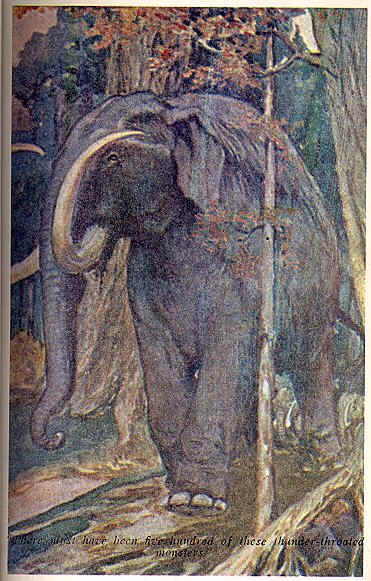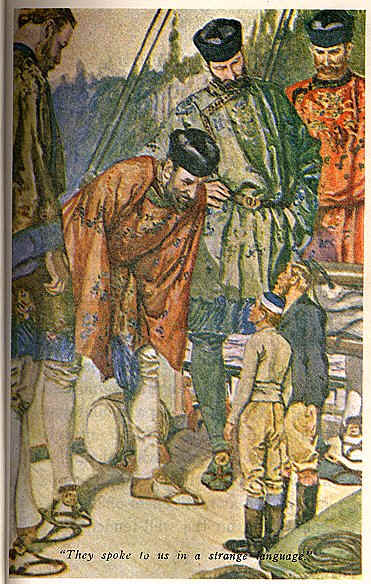
By Dean Dominic De Lucia
In Shree
Ramayana we have several scenes which are suggestive of the existence of inner
areas of the Earth’s crust as well as a hollow cavity. For example, after
Shrimati Sitadevi had been kidnapped by Ravana, Shree Laksman swore to Rama that
he would persue the rascal even if Lakshman had to chase him to the "dark
caverns of the Earth". In chapter 8 of Kishkindya, Rama proves his ability
to Sugriva by discharging an arow which "pierced through seven palms, a rock, the INNERMOST region of the Earth and in a minute again came back to
the quiver."
Now the
first comment by Lakshman is not so revealing, really; we already know that huge
caverns and openings exist within the Earth. Underneath the midwestern United
States there is a huge aquifer, for example, which lies underneath various
states. The second comment, too, seems to suggest not solid rock within the
Earth but rather cavern worlds. Finally, the flow of the Ganges into the hollow
earth from an ocean smacks of the opening which the Brahmanda Purana makes
mention of, situated in a “
northern ocean,“ and into which the Sons of Sagara entered “ with great delight.”
Actually,
the Puranas make several comments in relation to the hollow portion of the Earth
in various narrations. Another narration tells us that, at the end of Kali Yuga,
the Kalki avatar will be born in the best of Brahmin families of Shambhalla- a
city identified in both Puranic as well as Tibetan lore as a city in the hollow
earth- and that He will anniliate the miscreants on the entire surface of the
globe. Afterwards, the general Puranic version goes that Vedic culture will be
re-established on the surface by the civilization within, to begin another cycle
of yugas, ages.
Well, there shouldn't be such a city on the surface of the planet at the end of
the age of Kali (432,000 years) which could support brahmin families. The age
of Kali is a part of the Puranic cycle of destruction and renovation, and by the
end of the Kali age, the world is described as a desolate place. For example,
the Puranas describe that a man of 15 years will be considered very old, and
that human beings will have practically no memory, no intelligence, be only a
few feet tall and that they will wander around in packs like animals. The world
is described as barren and desert-like at that time. Given this scenario, where
is there any scope for a city by the name of Shambhalla containing brahmin
communities?
Again, there is the narration in the Puranas about the sons of Sagara. They were
given the task of searching for the sacrificial horse who was stolen by Indra in
order to interrupt the sacrifices of Maharaj Prithu. In their search, the
Puranas say that they travelled in a Northeastern direction and came to a
Northern ocean, which they traveled over, and that they entered into the bowels
of the Earth. There, they found the horse at the hermitage of Kapila Rishi.
It is to be understood that, according to these narrations, Vedic culture
flourished in the hollow Earth, as none other than Kapila Rishi had his
hermitage there, and the Kalki avatar will make His appearance there.
How congruent, then, are the descriptions given by Olaf Jansen, the Norwegian
youth who wandered into the opening with his father on their fishing boat in the
1820s. They traveled in their sailboat to Spitzenburg, an island above Greenland.
After stopping at the
northern side of this island to take on some supplies,
they set sail towards good fishing areas. But the boy's father was possessed by
a disire to head further North, to the warm lands of the Norse legends, and
assured the boy that they would be protected by the gods Thor (Jupiter) and
Odin. Then, even though this was a bit of an irresponsible risk to take with
one's boy under tow, off to the North they went!
They soon met with ice packs and had to carefully negotiate their craft
between
them. Olaf relates that had their boat been any larger, they would not have been
able to fit between the icebergs. After about a month of such negotiation, the
ice disappeared and marvelously, they found themselves in open water, just a few
degrees from the pole! This does not correspond to our typical concept of the
Polar areas, which we imagine are covered by a solid ice sheet. But actually,
practically all the Polar explorers of yesteryear reported open waters near the
Poles, and a whole phenomenon called "
polar warming." This phenomenon
seems to result when warmer air from the interior of the planet is expelled from
openings near the Poles. At any rate, the two continued on in this way, in open
waters, for various weeks.
As the father and son worked their way further in they came to the shoreline of
a continent and followed it. They noticed huge trees and mammoths twice the size
of elephants.

They
were given a welcome treatment in the hollow Earth; they toured the kingdoms of
Shambala the Lesser and Shambala the Greater. Their boat was taken from city
to city and displayed as an object of curiosity and marvel, a midget craft of
the tiny men who had wandered in from the surface.
At one point they crossed paths with what the Olaf described as a gigantic ship,
bigger than any he had ever imagined. Of course, this was in 1830. It seemed to
him to be some type of cruise or excursion ship because the decks were flooded
with people singing songs in a jolly mood. The two voyagers were met by
occupants of the ship and taken aboard. They found themselves in the company of
humans of giant stature, the shortest being over 12 feet tall!

What
exactly about Olaf's report was suggestive of Vedic culture, as it was before
the beginning of Kali Yuga, in the hollow Earth? Well, we already know that Olaf
reported giant human beings. Among other things he also reported that they
enjoyed a life span of around 800 years, great
intelligence, that they spoke Sanskrit or a close derivative, were of a Northern
European stock of race, worshipped the inner Sun and a pantheon of gods similar
to the Indo-European. He reported that the flowers all had tremendous fragrances,
that the fruits were more tasty than on the surface, and that fruits and flowers
were giant in size, an apple being the size of a man's head..
" Vegetation grew in lavish exuberance, and fruit of all kinds possessed
the most delicate flavor. Clusters of grapes four and five feet in length, each
grape as large as an orange, and apples larger than a man's head typified the
wonderful growth of all things on the " inside " of the earth. The
great redwood trees of California would be considered mere underbrush compared
with the giant forest trees extending for miles and miles in all directions. In
many directions along the foothills of the mountains vast herds of cattle were
seen during the last day of our travel on the river."
It suffices to say that to anyone familiar with the puranic descriptions of
human beings before the advent of Kali Age, Olaf's testimony provides a shocking
correspondence.
The Puranas tell us that Kali Yuga was ushered in as a result of Kala, time.
This word Kala has also been used in the Vedic astrological literature
synonymously with the term "planetary influence." It seems that the
alignments and orbits of the planets changed in order to cause this Yuga, and
quite possibly the radiation from the Sun has changed, too, or
perhaps
our planet is closer to it. For example, the Brihat Jataka quotes an
impossible
alignment between
Venus and the Sun, from a previous, extinct Vedic Jyotish literature;
which is no longer possible at this point in the
Kali Yuga.
The point being that if planetary influences, such as harmful radiations, are
responsible for bringing about the Kali Yuga for those openly subject to them on
the surface, it just naturally follows that those who live within the hollow
portion of the Earth are protected from such influences, and that their standard
of body, mind and intelligence have not degraded, at least not as much as ours
on the surface. After all, we are only 5,000 years into the Kali Yuga, not
50,000 nor 100,000 years, and those within are certainly sheltered by the
Earth's crust and various strata.
Could this be the situation? Has a past Vedic connection with our brethren in
the interior been lost to our collective memory? Knowing that there was nothing
that they could do, did the inhabitants of the hollow Earth eventually distance
themselves from us and only impose a guiding hand from afar?
If we may take stock in Olaf's testimony, they themselves are not lost, they are
very much still there- in the hollow portion of the Earth.
Maricha and Other Shapeshifters